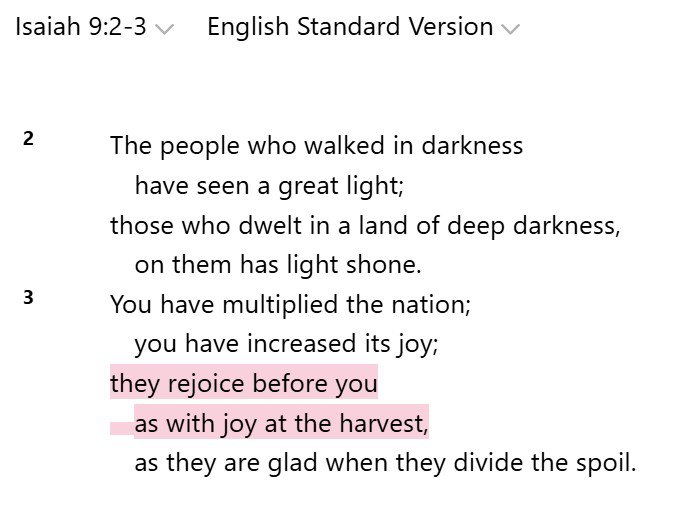
 img:biblegateway.com
img:biblegateway.comHappy New Year's Eve
It’s been a while since I stayed awake long enough to ring in the new year.
This year, since my kids seemed more interested than in previous years, I was awake when the neighbors started firing off their shotguns, signalling the fact that they have shotguns to fire off.
I am lacking in shotguns. But we had some tasty snacks and there were high fives at 12:00:01AM.
The neighbor’s shotguns continued well past 1:00:00AM.
So I got to thinking about how people celebrated in Bible times.
We know a whole lot about how people worshiped, particularly during the religious festivals like “Feast of Trumpets” (the Israelite “New Year”), or “The Day of Atonement”.
Those worship celebrations took place primarily around the Tabernacle (or Temple once it had been built).
We know a lot about them because they make good subjects for Sermons, Bible Classes, and Small Group meetings.
As I woke up (to feed the dog at the same early hour as usual) on January 1st, I wasn’t wondering about the religious festivals of the Bible.
I was wondering what other types of events caused the ancient people of the Bible to fire off their shotguns in the middle of the night.
And if you don’t believe me that the ancient Israelites had shotguns, here’s proof:

Ok, this image was created by Artificial Intelligence. To see more ridiculous AI images from Bible stories, Click Here
No, when I woke up on New Year’s Day, I was wondering about the more secular celebrations that might have added a little spice to ancient Israelite life.
Here’s what I found.
The Dedication of a Newly Built House
Here’s a line straight from Moses: “‘Is there any man who has built a new house and has not dedicated it?” - Deuteronomy 20:5
We don’t know exactly what that dedication might have looked like, though we know a lot about what other ancient cultures might have done.
There was often the pouring out of wine or oil as a symbolic request for divine blessing.
Sometimes there was animal sacrifice or other kinds of burnt offerings which would have produced pleasant aromas which graced the new home for days afterward.
Egyptian and Mesopotamian cultures would place “sacred” objects under the foundation or inside the walls of the home. This was believed to curry favor from the gods.
There were prayers, songs, and meals.
Special attention was often paid to the threshold itself, where the world could be divided between “out there” and “in here”.
Home dedication was special.
And though we do not have much Biblical data about the day-to-day cultural traditions of the Israelites, we do have Psalm 30.
Psalm 30 begins with a superscription (like a title): A Song for the Dedication of the House of David.
Some modern translators have chosen to render the Hebrew title like this: “A song at the dedication of the temple.” (ESV, NIV, RSV)
It’s possible, I suppose, that this could have been written during the rule of Solomon, during whose reign the Temple was constructed.
And it’s possible that the Psalmist chose to refer to the Temple as the “House of David” (which is literally what the Hebrew text says, “house of david”).
But for my money, this Psalm was written by David himself at the dedication of his personal living space, otherwise known as his Royal Palace.
Not only does this make for a simpler explanation of the superscription, but it also brings to life the most famous line from Psalm 30, “Weeping may tarry for the night, but joy comes with the morning.”
People don’t go to sleep in the Temple and wake up the next morning under the golden lampstand.
They go to sleep at home and wake up in their beds, and as long as their neighbors weren’t firing off shotguns until 1:30am, they probably got some decent sleep.
Weeping may indeed tarry for the night, but joy comes with the morning.
Sounds like a perfect Psalm for the dedication of a home.
The Weaning of a Child
This is another one of those domestic milestones that has lost some of its lustre over the centuries
For one thing, according to the Center for Disease Control, only 25% of American Babies receive any breastmilk beyond six months. About 7% never receive any at all.
In other words, American babies are weaned early.
From the records we have of cultures that are contemporaneous with Biblical Israel, babies were nursed for at least two years, and sometimes up to four or five years.
When Samuel was weaned from Hannah, he was taken to the sanctuary and presented to the Lord. Hannah kept her promise.
But it’s hard to conceive of a situation where she would have done that at 6 months! Little Samuel was likely 5 or so years old by the time he was placed into Eli’s care.
Ancient moms would often rub sweetened liquids and pastes onto their baby’s gums to help them forget the mother’s milk.
And we do have one clear Biblical indication that the weaning of a child precipitated a party.
Genesis 21:8 tells us, “And the child grew, and was weaned; and Abraham made a great feast on the day that Isaac was weaned.”
I don’t think there were any shotguns involved, though there were certainly fireworks between Sarah and Hagar!
I’m guessing Abraham didn’t get much sleep that night either.
Sheep Shearing
In some respects, I wish this was still a thing.
In my home, anyway, we would do a lot more celebrating.
Not that we have sheep, but with 5 cats, a bird, and a dog, the amount of feathers and fur I sweep up on a daily basis could easily be mistaken for a Sheep Shearing festival.
There are two Biblical references to sheep shearing as a time of festivity in the home.
It was at sheep shearing time that the entire affair between David and wealthy Nabal took place.
You can find more about this interesting story in 1 Samuel 25. I recommend it. By the way, it helps to remember that the word “nabal” is Hebrew for “fool”... Have fun!
Verse 36 tells us, “Abigail came to Nabal, and behold, he was holding a feast in his house, like the feast of a king.”
No mention of shotguns, but you never know.
But actually, the other Biblical mention of a sheep-shearing feast very nearly did involve a shotgun.
Sort of.
It was 2 Samuel 13, and the Bible says that Absalom's sheep shearers had completed their work at Baal-hazor, in Ephraim.
Absalom threw a big party. At the party, he had Amnon murdered. So there’s that.
Probably not the kind of party any of us would want to attend after all.
But if anyone comes up with a good idea for cat-shearing, let me know. Just no shotguns.
Harvest Home
Of all of the home-based celebrations in Old Testament days, the harvest was responsible for the best and most of them.
The prophet Isaiah said, “You have multiplied the nation; you have increased its joy; they rejoice before you as with joy at the harvest...” - Is 9:3
Those harvest festivals must have been pretty remarkable in order for them to become the standard for joy by which Isaiah compared Israel’s feelings about God’s salvation.
The law provided two feasts that were specifically linked to the harvest.
The first was originally (or perhaps not-so-originally!) called, “The Feast of the Harvest”.
Don’t blame Moses for that lack of creativity, he was just writing down whatever God told him.
As the centuries wore on, the Feast of the Harvest picked up a more interesting name, “Pentecost”.
It was linked specifically to the grain harvest, and designated to express thanksgiving to God for His gracious provision of food.
It was also a time of rest and feasting. And although Moses never comes right out and says it, no shotguns were permitted, day or night.
The second harvest-oriented party was called The Feast of Ingathering.
It was held after the olive and fruit harvest. You might know it by its other name, “The Feast of Tabernacles”.
Happy New Year!
So, yes. There was a lot to celebrate, a lot to be thankful for, and plenty of reason to blow off some steam, if not a few shells from a .30-06.
I hope you had a lovely opportunity to celebrate the transition between 2024 and 2025.
Remember to give thanks to God for all He has done, and place your trust in Him for your future.
And while there are plenty of reasons to be out and about on New Year’s Eve, perhaps you were able to turn your home into a place of joy and celebration.
I also hope your neighbors ran out of ammo before mine.



